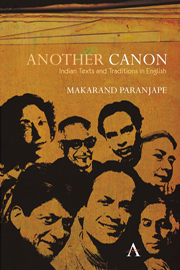Book contents
- Frontmatter
- Contents
- Preface
- 1 Introduction
- 2 Conversations in Bloomsbury
- 3 Comrade Kirillov
- 4 ‘A Horse and Two Goats’
- 5 The Tale of an Indian Education
- 6 ‘Clip Joint’
- 7 Cultural and Political Allegory in Rich Like Us
- 8 Towards Redefining Boundaries
- 9 The Golden Gate and the Quest for Self-Realization
- 10 Journey to Ithaca An Epistle on the Fiction of the 1980s and 1990s
- 11 Cuckold in Indian English Fiction
- 12 Stephanians and Others
- Works Cited
- Index
6 - ‘Clip Joint’
Modernity and Its Discontents
Published online by Cambridge University Press: 05 March 2012
- Frontmatter
- Contents
- Preface
- 1 Introduction
- 2 Conversations in Bloomsbury
- 3 Comrade Kirillov
- 4 ‘A Horse and Two Goats’
- 5 The Tale of an Indian Education
- 6 ‘Clip Joint’
- 7 Cultural and Political Allegory in Rich Like Us
- 8 Towards Redefining Boundaries
- 9 The Golden Gate and the Quest for Self-Realization
- 10 Journey to Ithaca An Epistle on the Fiction of the 1980s and 1990s
- 11 Cuckold in Indian English Fiction
- 12 Stephanians and Others
- Works Cited
- Index
Summary
‘Clip Joint’ is considered as one of U R Anantha Murthy's most significant short stories. Though better known for novels like Samskara, (1965), Awasthe (1966) and Bharatipura (1973) Anantha Murthy's short stories, some of which are quite substantial in length, are a very important part of his oeuvre. Not only is Anantha Murthy one of India's greatest living novelists, one proof of which is that he has won every major literary award in India including the Jnanpith, but what is perhaps equally important is that he too, like other major Indian writers, has grappled long and hard with the problem of India's response to the West. What is Indian modernity? How is it different from Western modernity? Which aspects of tradition are worth retaining and which must be discarded? These and other such questions, appearing as they do in text after text, constituting the thematic burden of his works. And they are explored more intensely in the short stories as they are in the longer novels. That is why it is important to look at a work such as ‘Clip Joint’. Though originally written in Kannada, it is not only set in England where Anantha Murthy lived as a postgraduate student, but is now available in an English translation. It thus becomes a part of the larger Indian English corpus and belongs to a national or transnational readership, not just to a local or regional one.
- Type
- Chapter
- Information
- Another CanonIndian Texts and Traditions in English, pp. 61 - 71Publisher: Anthem PressPrint publication year: 2009



